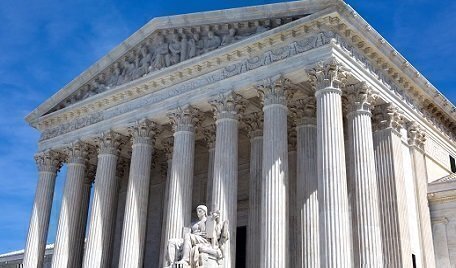 The Supreme Court on Tuesday afternoon ordered a new round of legal briefs in the controversy over President Trump’s executive order seeking to impose new immigration restrictions, giving itself the option of considering on June 22 what to do with the two cases before it. If the court were to grant review after that private conference a week from Thursday, the timetable for a decision before the end of the term would be very tight.
The Supreme Court on Tuesday afternoon ordered a new round of legal briefs in the controversy over President Trump’s executive order seeking to impose new immigration restrictions, giving itself the option of considering on June 22 what to do with the two cases before it. If the court were to grant review after that private conference a week from Thursday, the timetable for a decision before the end of the term would be very tight.
It would have the option, of course, of granting review but not going through with the review until its next term, starting in October, but that alternative also has complications.
The court’s processing of the Trump Administration’s appeals in the two cases has been slowed down a bit because one of the lower court decisions it is now being asked to review just came out on Monday, when the other case was nearly finished with the filing of briefs.
Earlier in the day, the Trump legal team asked the Justices to give it the opportunity to file a new brief to react to the decision on Monday by the U.S. Court of Appeals for the Ninth Circuit. The state of Hawaii, on the other side of that case, asked for fewer additional briefs.
Reacting to the two letters, the court issued this order: “In consideration of the June 13, 2017 letters received from applicants and respondents, applicants are directed to file a supplemental brief on or before 3 p.m., Thursday, June 15, 2017. Respondents are directed to file a response on or before 12 p.m., Tuesday, June 20, 2017. Applicants are directed to file a reply on or before 12 p.m., Wednesday, June 21, 2017.” (“Applicants” are the President and other officials and “respondents” are the state of Hawaii and a Hawaiian Muslim religious leader — the challengers to the Trump order in the Ninth Circuit case.)
With the Justices scheduled to hold a private conference on June 22, it appears, from the new briefing order, that the Justices will take no action until at least that meeting. They are also considering a separate case, from Maryland, that was decided in May by a different appeals court, the U.S. Court of Appeals for the Fourth Circuit.
In both cases, Administration lawyers are asking the court for two things: first, to allow the government to begin enforcing immediately the executive order, and, second, to agree to rule on the legality of the President’s action. In both cases, lower court judges have refused to allow enforcement, and have ruled that the executive order probably violated federal immigration laws (the result in the Hawaii case in the Ninth Circuit) or probably violated the Constitution (in the Maryland case in the Fourth Circuit).
The executive order provisions that the Administration wants to put into effect are a 90-day suspension of entry into the U.S. of foreign nationals from six Mideast nations, and a 120-day suspension of entry of any refugees from anywhere in the world. Both are at stake in the Hawaii case; the Maryland case involves only the 90-day suspension of arrivals from the designated nations.
It is the court’s usual practice to try to finish up its work in a term by the end of June or early in July. Thus, if the court has any thought about ruling — before the summer recess — on any of the issues regarding the executive order, it would have to act with unusual dispatch. It has the capacity to do so, but that would put great pressure on the Justices and on the lawyers involved in the cases.
Legendary journalist Lyle Denniston is Constitution Daily’s Supreme Court correspondent. Denniston has written for us as a contributor since June 2011 and has covered the Supreme Court since 1958. His work also appears on lyldenlawnews.com, where this story first appeared.
Recent Stories on Constitution Daily
Government offers timetable on immigration cases
Looking at the latest Emoluments suit against Trump
Trump immigration order blocked again, more broadly







